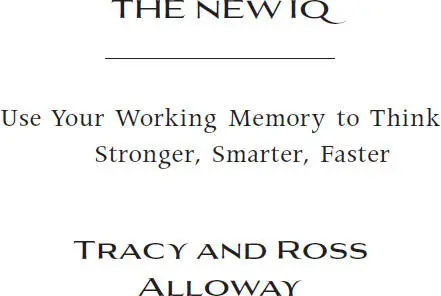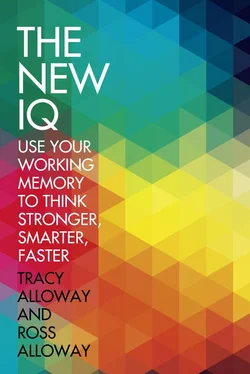

For our little heroes, M. and M.
Names and identifying details of some of the people portrayed in this book have been changed, and some people portrayed are composites or are created for illustrative purposes.
CONTENTS
Title Page
Dedication
Preface
PART I: The New IQ and You
1. Welcome to the Working Memory Revolution
2. Why Working Memory Is Crucial to Success
3. The Joker in the Mines—How Working Memory Makes Us Happier
4. Failures, Bad Habits, and Missteps
5. The Most Important Learning Tool— Working Memory in School
6. The New Mind-Body Connection—Working Memory in Sports
PART II: Growing and Improving Working Memory
7. Working Memory Across the Life Span
8. Working Memory Training 101
9. Secrets of Working Memory Specialists
10. Feed Your Brain, Fuel Your Working Memory
11. Seven Habits to Supercharge Working Memory … and a Few to Avoid
PART III: The Future and Past of Working Memory
12. Designing the World for Working Memory
13. The Dawn of Working Memory
Footnotes
Bibliography
Working Memory Quick Hits Manual
Acknowledgments
About the Authors
Copyright
About the Publisher
PREFACE
Intelligence That Matters
Does IQ matter? Perhaps it may matter to your school; perhaps to an employer when hiring, but does it really matter to you ? This number—somewhere between 85 to 115 for most of us—seems to have lost its significance. Of course, you may be pleased to find that your number is closer to 115, but if you found that it was closer to 85, would you be all that concerned? If you answered “no” or “probably not”, you’re not alone. In an age when nearly any factoid can be had at a few taps of the keyboard, IQ—a measure of intelligence synonymous with the accumulation of information readily available on Google—seems outdated and even quaint in the context of everyday life. Is a 115 going to make it easier for you to cook dinner, help the kids with their homework, and answer the phone at the same time? Does a 115 help you find happiness when things aren’t going your way? Will a 115 help you manage stress or resist the chocolate éclair? Will it give you a compelling response to the surprise question in the interview? The answer is no. The world we live in, the world that matters to us, demands a new conception of intelligence.
This book is about an intelligence that helps you succeed in the small things that comprise the ebb and flow of your life—like adapting a PowerPoint presentation for a new client, negotiating a treaty between warring offspring, and juggling football practise with the new product deadline. This intelligence is also deeply implicated in those meaningful moments as well, like when you were tongue-tied upon meeting the love of your life, or when you controlled your panic and found your five-year-old in the toy section, or when you came to accept the loss of a job and took the first step toward a new career. This book is about intelligence that matters.

The New IQ and You
1
Welcome to the Working Memory Revolution
IN DECEMBER 2005, a broker on the Tokyo stock exchange sold 610,000 shares of a company called J-Com, for the low, low price of 1 yen, an amount less than a penny. The problem is that he meant to sell one single share for 610,000 yen. Epic oops. In 2001, a London dealer sold 300 million pounds sterling’ worth of shares when he intended to sell only 3 million pounds. The trade sparked a panic in the market that caused 30 billion pounds to go up in smoke.
Brokers may process mountains of information when deciding what to sell and buy, but in the heat of the moment, all it takes is just one extra piece of information—the ring of a phone, the flash of a screen, the thrill of being responsible for such a large sum of money—and their focus is lost. No longer able to process all the information, they struggle to check orders carefully. Trading is a profession that places high demands on a foundational cognitive skill called working memory .
By working memory advantage , we mean that this skill gives you a leg up, a boost in life. As you will discover, working memory offers you an advantage in a huge range of activities: from the everyday, like giving an important presentation at work, to the extreme, like ripping down an eighty-foot wave. It helped our evolutionary ancestors to advance from just surviving to thriving. It enabled our technological trajectory: from a bone club used for bashing to an iPhone used for connecting. By ignoring, overloading, or undermining your working memory, you put yourself at a huge disadvantage. But by focusing on your working memory, taking it into account, and improving it, the sky’s the limit. We wrote this book in order to give everyone an opportunity to take advantage of this life-changing skill.
In the past decade, research on working memory has exploded. It is fast emerging as one of the most widely researched cognitive functions of the twenty-first century, and we have been leading participants in much of this research. Tracy developed a groundbreaking and highly accurate standardized working memory test for use by educators and has dedicated much of her research career to investigating the role of working memory in education and learning difficulties. Ross has focused his attention on developing exercises to improve working memory, and as the CEO and founder of Memosyne, Ltd., he developed working-memory-training software called Jungle Memory that has been used by thousands of students. Together, they have examined the role of working memory in a variety of contexts, such as how it changes when you get older; how it is linked to happiness; how it relates to lying; how it is affected by activities like barefoot running; and how it is influenced by social media like Facebook.
Working memory is our ability to work with information. More precisely, working memory is the conscious processing of information . By conscious, we mean that the information is on your mind. You are giving attention to it, shining a mental spotlight on it, concentrating on it, or making decisions about it. You are also intentionally ignoring everything else. If you are thinking about a stock trade, for example, you are filtering out the ringing phones, the jabbering of your coworkers, and the excitement of placing a $1 million order. By processing , we mean that you are manipulating the information, working with it, making calculations with it, or reformulating it.
The classic example of a job that requires a strong working memory is that of an air traffic controller, whose job is to maintain the safe and orderly flow of air traffic. With hundreds of planes taking off and landing every hour, an air traffic controller must have the mental agility to process multiple variables, such as equipment, weather patterns, traffic volume, precise communication with pilots, and quick calculations. In times of emergency, they must be able to make split-second decisions while effectively moderating the stress of knowing that the lives of pilots and passengers are in their hands.
Читать дальше















